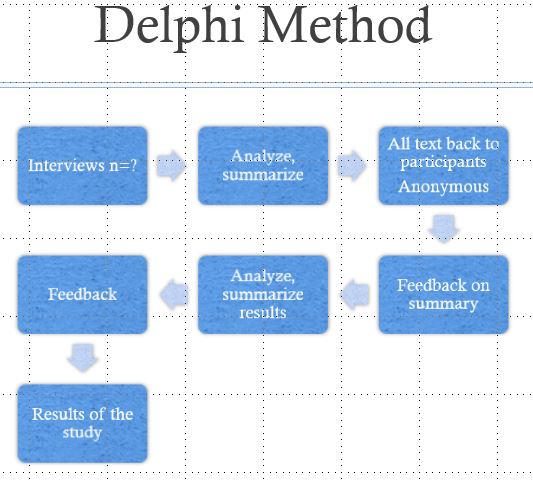For instance, if you are a project manager and your task is to research for a project on a specific topic.
So, You need to find results and events that can create an impact on your project and Sometimes future events are positive and sometimes they are negative.
Furthermore, It is difficult to find a plan for your project. In these cases, the Delphi method helps you as a project manager because the Delphi method is like a forecasting system.
Another example, suppose if you want to research on the panel of forecasting questionnaires then you want to learn the Delphi method for Several Rounds of questionnaires for the group of experts.
So, This group of experts providing a group response Delphi method seeks to reach the correct response through consensus.
WHAT’S IN IT
What is Delphi method

Delphi method is a process that is used for setting a framework in forecasting which is used in multiple rounds of questionnaires sending expert panels and anonymous responses to your questions which can be shared with other group experts.
Delphi method is an iterative process. So, This involves getting the board and a wide range of comments and opinions of group experts for the current topic and project. This method’s first step is questionnaires and then all questionnaires are commented on.
Then they compile and summarize all questionnaires. Go for the second round of questionnaires when all questionnaires are commented then they move on to the third round. So this is the reason the Delphi method is iterative.
History of Delhi Method
Olaf Helmer and Norman Dalkey of Rand Corporation developed the process of the Delphi method and the name “Oracle of Delphi”. Hence, the Delphi method allowed experts to work and conduct the questionnaires in series and release or get feedback with other rounds.
Working of Delphi Method
Firstly, the group selects the group of experts on the topic which are selected by group examination. Once participants are confirmed.
Then each member starts sending questionnaires to instruction and commenting on each topic which is selected by a group of experts and shares your experience.
So, Questionnaires were returned to the facilitator and prepared copies current topic, and compiled the comments. At last, the participant used the topic for current and further started commenting.
Hence, In the end, start the commenting section, the Expert returned all questionnaires. And go for another round based on the current results and Check for publishing and This method is repeated many times.
Steps of Delphi Method

So, Delphi method provides a wide range of steps that helps you to achieve success in your project. The steps are the following.
Step I :Choose team or facilitators for your Project
So, Your first step is to find a team of facilitators for your project who are neutral persons that are helping in your project.
Step II :Find Experts for your project
In the Delphi method, you need an expert or group of experts because it depends on the panel of experts.
Step III :Define the problems of your project
In a project, you need to make a checklist that you find the problem and issue of the project and then you need a summarized definition of all problems within your project.
Step IV :First Round of Questionnaires
When you understand the problem of your topic or project. Hence, Make questions in the form of surveys and questionnaires. Then collect all surveys and data. So, Removing the irrelevant data from your project and look for comments and feedback.
Step V: Second Round of Questionnaires
So, the Second Round is based on the result of the first questionnaires. Hence, In simple words all relevant answers of first-round questionnaires. So, In those cases, the second round starts again, writes questions, makes surveys, and gets the result moved to the third round.
Step6:Third Round of Questionnaires
When the second round completes, move to the third round and again repeat the steps.
Step7:Analyze on your Finding
Delphi method is an iterative process, you can also move on to the fourth-fifth round. So, according to research, most of the time third round is a decision-maker. Hence, Analyze all answers and convert your findings into plans that decrease the risk in the future. and finding Opportunities for your project topic and upgrade.
Delphi Method Examples
For instance, for Example of using the Delphi method, Suppose you are working as a project manager in an organization like In IT business pharm, or in medical pharm, etc. Your task is to make your organization’s product successful in the market.
And also want opinions on your product and finding consensus “How to make your project successful in the market”.
In that case, The Delphi method comes and helps you because it works like a forecasting system. Now this time, you can invite 100-200 people who worked on your organization or sometimes you invite outsiders to participate in answering the questionnaires.
Conduct the survey or questionnaires, ask the participants to rate the survey, and answer the questions for achieving the goals. Followings options are must include in your questionnaires.
These five questions in your survey allow people to rate between one to five rating options. Show this result on the tabular form including participants’ names and write its end percentage as shown on the given table.
| Questionnaire | Participants 1 | Participants 2 | Participants 3 | Participants N | percentage |
| Effective team development | 2 | 5 | 3 | 1 | 10% |
| Product pricing | 5 | 2 | 4 | 4 | 60% |
| Product size | 5 | 5 | 5 | 5 | 100% |
| Feedbacks | 4 | 3 | 3 | 3 | 70% |
| others | 5 | 4 | 3 | 1 | 70% |
This tabular generates through “when participants filled the survey and you received feedback”. Once you get the feedback then you repeat the step until you are not getting the result and achieve the thought from the expert.
Example Summary
In simple words to explain the previous example is that, conduct the questionnaires and survey and invite 100+ participants to fill the survey. make the table according to feedback until each participant filled the questionnaires. When the survey is completed then conduct 2nd survey then again invite and ask to fill the survey and make a table of feedback. Once you get the feedback then you repeat the step until you are not getting the result and achieve the thought from the expert.
Advantages and Disadvantages

So, The Delphi method seeks the opinions from the set of experts diverse and done without physical meeting that causes budget time and money. Consequently, This response can generate responses through individuals and panelists.
So, Multiple rounds should give the result and consensus can be reached over time and that can affect the period.
Disadvantages of the Delphi method allow the expert commentary, but the result does not in live discussion in the same sort.
Because live discussion can produce better consensus and ideas. Although broken down reassessment of the current topic. Hence, Delphi method can belong that causes the rate of discussion. In that case, the budget increases overtime period.
Receiving Information back to experts which are not providing the innate value.
Conclusion
In the article, we are understanding the Delphi method in detail. And Learn the advantages and disadvantages of this method that help you in the forecasting of questionnaires.
In other words, we learned the working of the Delphi method. This method helps you to work on current topics that are selected by the groups. It can be iterative and multiple rounds. Use commenting through other groups.
Also you can read our blog on How To Learn RISK IMPACT AND PROBABILITY CHART
FAQs
It is a structured technique and method for communication .That develops a systematic and interactive way of forecasting which relies on a panel of experts or a group of experts.
This technique is used for conducting the questionnaires which can be agreed by exerting through commenting which achieve a consensus option through agree and disagree.
Modified Delphi method is that ,In this strategy that uses review from literature ,stakeholders opinions and expert judgment on your research .And Also involve the national expert for the development of survey or questionnaires.



